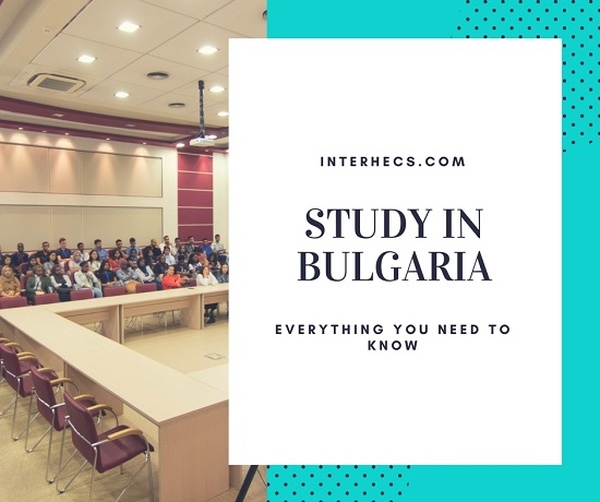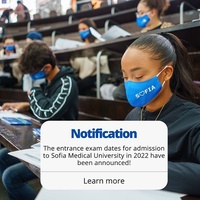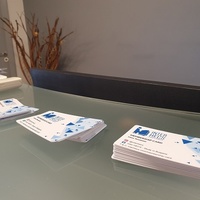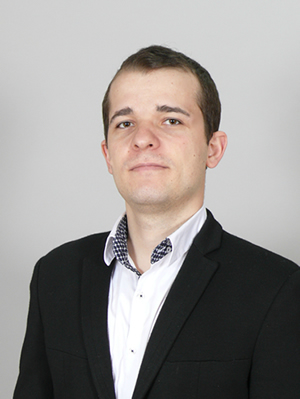Study in Bulgaria: Everything you need to know
Postato da: Inter HECS 7 anni, 5 mesi fa

Study in Bulgaria: What you need to know
Do you wonder whether to study in Bulgaria? Below you will find useful information about Bulgarian universities, tuition fees and study programs, language barrier, application procedure etc.
1. Location
Let's start from the very beginning. Bulgaria is located in the southeastern part of Europe right next to Turkey and Greece. Other neighbouring countries include North Macedonia, Serbia and Romania. The best part is that the Black Sea is on the West side of Bulgaria so there are plenty of opportunities for people to enjoy summer!
There are several big international airports that make it convenient for foreigners to reach the country (e.g. Sofia International Airport, Plovdiv Airport and Varna Airport). In general, it takes about two hours and a half to reach Bulgaria if you are coming from the United Kingdom. Of course, low-cost airlines like Ryanair and Wizzair have made it possible to spend less than 20 EUR for a flight ticket!
Sofia, the capital city, is located in the Western part of Bulgaria, close to Serbia. It has good connections to each city in Bulgaria. Plovdiv, the second biggest city in Bulgaria, is located in the middle of Bulgaria - this way you can reach any city in Bulgaria within a very short period of time. Varna is pronounced the Sea Capital of Bulgaria - it is located at the Black Sea coast and attracts tourists all year round.
2. Benefits
More than 2000 foreigners apply to study in Bulgaria every year. Why? There are plenty of reasons, but let's name just a few of them:
Bulgaria is part of the European Union so the diplomas are internationally recognized.
The high quality of higher education as well as the fact that the study programs are in English language is also something that is very important to each international student - and Bulgaria also meets these requirements.
Life in Bulgaria also doesn't cost much - more about the cheap living expenses and tuition fees below!
3. Universities
There are prestigious universities in every big city in Bulgaria. Some of the most popular Bulgarian universities include Sofia Medical University and Plovdiv Medical University. You can probably guess that students choose these universities because they offer Medicine in English - the most common study program among foreigners in Bulgaria. In addition, as mentioned above, Sofia and Plovdiv are the two biggest cities in Bulgaria so it comes naturally that they have quite a lot to offer to people who live there.
The university facilities are also very modern and teachers focus on practical knowledge. The tuition fees range between 3000 and 8000 EUR per year which is cheaper in comparison to other Universities abroad.
Students from all countries are welcome to apply!
Find more information about tuition fees and student loans in Bulgaria!
4. Study programs
You can pretty much study everything in Bulgaria - study programs at Bulgarian universities range from Computer science to Medicine. Of course, the study programs are available in English language and can be in either Bachelor or Master's degree.
The academic year usually starts in September or October and finishes around June. The academic year is divided in two parts - winter semester and summer semester.
It is common that students study Bulgarian language as part of their curriculum - this way they pick up language skills throughout their education in Bulgaria!
5. International students
The number of international students living in Bulgaria is growing each year! Bulgaria is becoming a famous destination for people who want to study abroad and expand their horizons! Nevertheless, it is rather less competitive to get a place in a Bulgarian university (in comparison to other countries) as the admission requirements are lower and there are many study places offered each year!
Of course, most international students are either in Sofia or Plovdiv. A significant part of foreigners who live in both cities are from the United Kingdom, Greece, Germany and Italy. You definitely don't need to worry about finding friends from your home country!
6. Life and safety in Bulgaria
According to foreigners, life in Bulgaria is pretty cheap. BGN (lev) is the Bulgarian currency and it can cost around 10 to 15 leva (5 to 8 EUR) to have quite a big and good meal in a restaurant (of course, it is much cheaper if you don't eat in the fanciest restaurants). Of course, living in Sofia (being the capital) is more expensive in comparison to staying in other Bulgarian cities.
Bulgaria is also considered a safe country. It is very common that students go out at night - however, there are plenty of people on the streets and locals are quite friendly.
7. Student accommodation in Bulgaria
Almost every university in Bulgaria has a student dormitory. Renting a room in a dormitory is about 50 leva (or 25 EUR) per month. However, dormitories are often located far away from the university and students must share the room with one or two more people. In addition, most dormitories do not have a kitchen.
This is why most people prefer to go for a private flat. The rent for a private or shared apartment in the city centre costs between 250 and 400 EUR per month. Most students prefer to find someone to share the flat with so that they also share bills.
8. Language barrier
Bulgarians speak Bulgarian language (quite similar to Russian language, but not the same!). Still, English language skills are quite common among young people. In addition, restaurant menus are often available in English language and most staff in shops can speak English, so you definitely won't be "lost in translation".
Picking up some Bulgarian language skills before you move to Bulgaria is recommended, though - locals love it when you try to speak their language and it is useful to know how to get around.
We also organize a Bulgarian crash course for international students moving to Bulgaria!
9. Application procedure and entrance tests
Students who wish to study at Bulgarian universities must collect application documents and in most cases, pass an entry exam.
Inter HECS - Study in Bulgaria offers full application assistance, as many of the documents must be apostilled, notarized, translated and legalized according to the universities' requirements. In addition, the registration forms are often in Bulgarian language, so our team will help you apply and enroll at the university.
Of course, our service also includes help with preparing for the entrance test!
You have more questions about living or studying in Bulgaria? Or you want to apply for admission in Bulgaria? Just contact us!
Novità

The entrance exam dates for admission to Sofia Medical University in 2022 have been announced.

Take part in a free online Open Day for Bulgarian Universities - learn more about the admission, entrance exams and life in Bulgaria!

Join the Inter HECS' community in Bulgaria - get a membership card with discounts to various places in Bulgaria!









